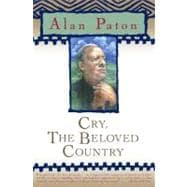
Note: Supplemental materials are not guaranteed with Rental or Used book purchases.
Purchase Benefits
What is included with this book?
The New copy of this book will include any supplemental materials advertised. Please check the title of the book to determine if it should include any access cards, study guides, lab manuals, CDs, etc.
The Used, Rental and eBook copies of this book are not guaranteed to include any supplemental materials. Typically, only the book itself is included. This is true even if the title states it includes any access cards, study guides, lab manuals, CDs, etc.
Chapter 1
There is a lovely road that runs from Ixopo into the hills. These hills are grass-covered and rolling, and they are lovely beyond any singing of it. The road climbs seven miles into them, to Carisbrooke; and from there, if there is no mist, you look down on one of the fairest valleys of Africa. About you there is grass and bracken and you may hear the forlorn crying of the titihoya, one of the birds of the veld. Below you is the valley of the Umzimkulu, on its journey from the Drakensberg to the sea; and beyond and behind the river, great hill after great hill; and beyond and behind them, the mountains of Ingeli and East Griqualand.
The grass is rich and matted, you cannot see the soil. It holds the rain and the mist, and they seep into the ground, feeding the streams in every kloof. It is well-tended, and not too many cattle feed upon it; not too many fires burn it, laying bare the soil. Stand unshod upon it, for the ground is holy, being even as it came from the Creator. Keep it, guard it, care for it, for it keeps men, guards men, cares for men. Destroy it and man is destroyed.
Where you stand the grass is rich and matted, you cannot see the soil. But the rich green hills break down. They fall to the valley below, and falling, change their nature. For they grow red and bare; they cannot hold the rain and mist, and the streams are dry in the kloofs. Too many cattle feed upon the grass, and too many fires have burned it. Stand shod upon it, for it is coarse and sharp, and the stones cut under the feet. It is not kept, or guarded, or cared for, it no longer keeps men, guards men, cares for men. The titihoya does not cry here any more.
The great red hills stand desolate, and the earth has torn away like flesh. The lightning flashes over them, the clouds pour down upon them, the dead streams come to life, full of the red blood of the earth. Down in the valleys women scratch the soil that is left, and the maize hardly reaches the height of a man. They are valleys of old men and old women, of mothers and children. The men are away, the young men and the girls are away. The soil cannot keep them any more.
Copyright © 1948 by Alan Paton